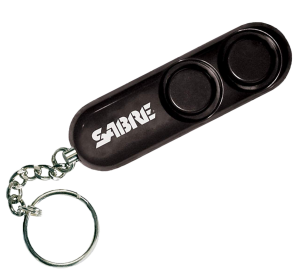Personal alarms have been making quite a splash recently, with more and more South Africans wondering if they should get one. Personal alarms are generally small, battery powered alarms that can be activated with a small button, switch or pull-chord or pull tab. The purpose is to alert anyone within hearing distance that you are under attack or in some sort of danger.
As with any security product we discuss on this website, we will deliver that facts and let you decide whether or not it makes sense for you or your family members to carry and use. Just as with any other security or self-defense weapon that you carry on your person, it is vital that you know how to use it and that you are prepared to do so.
Types of personal alarms in South Africa
Personal alarms are mainly manufactured in China and make a piercing sound when activated. They come in all shapes and sizes and are also called compact personal alarms or handheld personal alarms. Personal alarm keychains are the most common types of personal alarms on the market at the moment. Some even come with an LED light.
How loud are personal alarms?
If you review the product specifications, you will see the decibel (dB) level that the personal alarm sound reaches. Most personal alarms have a siren which reaches a decibel level of 120dB – which is louder than most car hooters that reach an average of 109 decibels. Basically, they are really loud and will have a disorientating effect on anyone nearby.
What can a personal alarm be used for?
The main purpose of a personal alarm, especially in South Africa, is to make others aware that you are being attacked or robbed by sounding a piercingly loud alarm. It can also be used to scare off animals such as dogs and other wild animals for campers, cyclists or pedestrians walking home. It’s also a good tool for sportsmen and anyone with medical issues that may want a simple and efficient way to alert those around them that something is wrong.
Some people also suggest that you can use the personal alarm to protect belongings such as handbags, suitcases, bicycles and others. The way this works is that the larger part of the personal alarm is fixed to the handbag, for instance, and then the pull-chord is fixed to your clothing. Other people have suggested using a personal alarm as a make-shift tripwire – not a bad idea but in South Africa these temporary solutions are simply insufficient for long term safety and peace of mind.
Using a personal alarm for a medical condition
Children and others with conditions such as asthma, diabetes and epilepsy may benefit from keeping a personal alarm around their neck to warn others when they need assistance. Using a personal alarm for a medical condition is a matter of personal choice and practicality and all options and alternatives should be considered.
Who should get a personal alarm?
- Primary and high school children who can be taught how to use the personal alarm, especially those who walk to and from school or use a bus or taxi
- Women and men who work on construction sites and in empty buildings
- Cyclists, hikers, campers and outdoor enthusiasts
- People who run, jog or walk outdoors for exercise
- Anyone who may need to ward off a dog, cattle or wild animal
- Children and adults with medical conditions
- People who live alone within close proximity to other households (such as flats and townhouses)
- Anyone who wants to improve their personal safety and peace of mind
Where to buy a personal alarm in South Africa
 I personally think that the Yale personal alarms are durable, effective and reasonably priced. If you’d like to buy a personal alarm online, you can so so via the Sabre website. From simple personal alarms, to those with LED lights and combination tasers, LED lights and personal alarms.
I personally think that the Yale personal alarms are durable, effective and reasonably priced. If you’d like to buy a personal alarm online, you can so so via the Sabre website. From simple personal alarms, to those with LED lights and combination tasers, LED lights and personal alarms.
Sabre personal alarms
This is a good quality personal alarm with a pull-out tab and hand carrying cord. Batteries can easily be changed by unclipping the back housing (no screws). The siren reaches 120 decibels and it comes with 2 6V lithium batteries inside it’s pack. It has standard manufacturer’s warranty. Purchase the Sabre personal alarm here here: Sabre personal alarm.
Personal alarm benefits and summarized uses:
- They are light and easy to carry and conceal
- They are super affordable with most coming in at below R150
- Most are weather and shock resistant making them durable
- Battery can last a few years if unused
- Siren will last for about 30 minutes
- Ideal for alerting people that you are in trouble in public places or anywhere where others may hear
- Can be used to scare of animals including to ward off dog attacks
- Can be used to help alert people you need help if you suffer from a medical condition
- Can be used as an anti-rape or kidnapping device
- Can be sounded to warn neighbors and scare off anyone trying to break into your house (as a make-shift alternative to an actual alarm system)
- Can be used as a trip wire or anti handbag theft device
When a personal alarm should not be activated
In my personal opinion, you should never attempt to activate a personal alarm during an armed robbery, hi-jacking or home invasion, especially if there are multiple attackers and weapons involved. An attacker or attackers may be shocked by the sound and may inadvertently or intentionally discharge their firearm or injure you.
They may be able to silence the alarm quickly and you may very well anger the perpetrators, worsening the situation. Just as with any robbery or hi-jacking, keeping calm, quiet and compliant is important. In such a situation sounding a personal alarm is simply too risky.
Preparing to use a personal alarm
When preparing yourself to use the personal alarm, you should activate it multiple times to practice the motion and feeling of doing it. Practice walking, perhaps with the alarm or your keys in your hand and then pull the tab or press the button. As always, I recommend visualizing an attack happening and, acting out or visualizing your appropriate response to it. This will improve your chances of using the self defense tool in the event of an actual attack.
If you have any questions about personal alarms or would like to share a story about how you made use of one in the past, leave us a comment!
